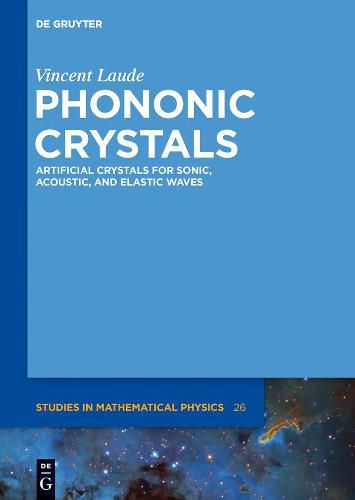Readings Newsletter
Become a Readings Member to make your shopping experience even easier.
Sign in or sign up for free!
You’re not far away from qualifying for FREE standard shipping within Australia
You’ve qualified for FREE standard shipping within Australia
The cart is loading…






This title is printed to order. This book may have been self-published. If so, we cannot guarantee the quality of the content. In the main most books will have gone through the editing process however some may not. We therefore suggest that you be aware of this before ordering this book. If in doubt check either the author or publisher’s details as we are unable to accept any returns unless they are faulty. Please contact us if you have any questions.
Phononic crystals are artificial periodic structures that can alter efficiently the flow of sound, acoustic waves, or elastic waves. They were introduced about twenty years ago and have gained increasing interest since then, both because of their amazing physical properties and because of their potential applications. The topic of phononic crystals stands as the cross-road of physics (condensed matter physics, wave propagation in inhomogeneous and periodic media) and engineering (acoustics, ultrasonics, mechanical engineering, electrical engineering). Phononic crystals cover a wide range of scales, from meter-size periodic structures for sound in air to nanometer-size structures for information processing or thermal phonon control in integrated circuits. Phononic crystals have a definite relation with the topic of photonic crystals in optics. The marriage of phononic and photonic crystals also provides a promising structural basis for enhanced sound and light interaction.
As the topic is getting popular, it is nowadays presented and discussed at various international conferences. After the first ten years during which the topic has remained mainly theoretical with a few proof-of-concept demonstrations in the literature, the evolution has been towards applications, instrumentation, and novel designs. The physical explanations for various effects are now well understood and efficient numerical methods and analysis tools have been developed.
The book contains a comprehensive set of finite element model (FEM) scripts for solving basic phononic crystal problems. The scripts are short, easy to read, and efficient, allowing the reader to generate for him(her)self band structures for 2D and 3D phononic crystals, to compute Bloch waves, waveguide and cavity modes, and more.
$9.00 standard shipping within Australia
FREE standard shipping within Australia for orders over $100.00
Express & International shipping calculated at checkout
This title is printed to order. This book may have been self-published. If so, we cannot guarantee the quality of the content. In the main most books will have gone through the editing process however some may not. We therefore suggest that you be aware of this before ordering this book. If in doubt check either the author or publisher’s details as we are unable to accept any returns unless they are faulty. Please contact us if you have any questions.
Phononic crystals are artificial periodic structures that can alter efficiently the flow of sound, acoustic waves, or elastic waves. They were introduced about twenty years ago and have gained increasing interest since then, both because of their amazing physical properties and because of their potential applications. The topic of phononic crystals stands as the cross-road of physics (condensed matter physics, wave propagation in inhomogeneous and periodic media) and engineering (acoustics, ultrasonics, mechanical engineering, electrical engineering). Phononic crystals cover a wide range of scales, from meter-size periodic structures for sound in air to nanometer-size structures for information processing or thermal phonon control in integrated circuits. Phononic crystals have a definite relation with the topic of photonic crystals in optics. The marriage of phononic and photonic crystals also provides a promising structural basis for enhanced sound and light interaction.
As the topic is getting popular, it is nowadays presented and discussed at various international conferences. After the first ten years during which the topic has remained mainly theoretical with a few proof-of-concept demonstrations in the literature, the evolution has been towards applications, instrumentation, and novel designs. The physical explanations for various effects are now well understood and efficient numerical methods and analysis tools have been developed.
The book contains a comprehensive set of finite element model (FEM) scripts for solving basic phononic crystal problems. The scripts are short, easy to read, and efficient, allowing the reader to generate for him(her)self band structures for 2D and 3D phononic crystals, to compute Bloch waves, waveguide and cavity modes, and more.